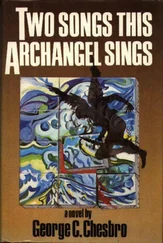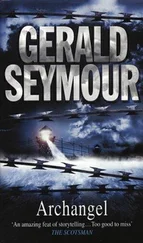“What time does our Phoebe predict?” Taggart asked.
Ed retrieved the magazine, found the right table, and ran a finger along one of the curved lines. “Just before ten,” he said, and then, ignoring both Constantine and Beryl, began planning with Taggart what they’d need for the following morning. A few minutes later, Beryl left. The men were still talking intently when Constantine went to bed: and talking, still — had they even slept? — when he rose and found them in the kitchen, eating crescent-shaped pancakes that Beryl, who called them “partial-eclipse cakes,” flipped on the griddle.
He ate three himself and they all scurried to finish the chores before gathering on the porch. Taggart produced pieces of smoked glass through which, he said, they could watch what was happening without damaging their eyes, and Constantine peered astonished through his as the moon’s shadow bit its first curve from the sun. So this was an eclipse! Ten forty-five, eleven o’clock; the sun was a chubby crescent pointing toward the lake, then a slimmer crescent pointing down. In Florida, Taggart said, those lucky enough to be in the shadow’s direct path would see an annular eclipse, a brilliant ring around the darkened sun. Here, as the eclipse peaked, a little more than half the sun was covered.
After a few minutes, Ed tapped his arm and pointed at the fluttering pattern of light and shadow under the big maple tree. “Take a look,” Ed said. “An indirect view’s as useful as a direct one — you can see the changing shape of the sun just as clearly there, on the ground. Each little hole between the overlapping leaves acts like a pinhole camera to project an image.”
What was a pinhole camera? Later he’d ask for an explanation but for now he trotted over to the tree and saw what Ed meant; light filtered through the canopy and cast bright crescents onto the ground, each the exact shape of the sun at that moment and all of them trembling with the breeze. On the porch, the adults had set down their bits of smoked glass and, leaning over the railing with outstretched arms, had made themselves into trees. Ed, in the middle, held his left hand angled left, fingers spread, with Taggart’s right hand lying perpendicularly across it. Beryl’s left hand, angled left, similarly crossed Ed’s right. Each set of intersecting fingers formed a cross-hatched pattern, which focused light like the leaves. On the ground bright slivers danced beneath their joined hands and the three of them laughed and laughed.

ON THE THURSDAY after the eclipse, Constantine heard the sound of the aeroplane’s engine while he was wading in the pond with his dip net, and again while he was tending the calves, but he missed seeing it. On Friday, while he was weeding the eggplants, he leapt up as soon as he heard the clattering whirr and ran to the rise, where he was rewarded with a glimpse of the varnished golden wings through the trees. On Saturday, the Fourth of July, the aeroplane was to fly in public, as part of the holiday celebration, and he planned to be as close as possible when it took off.
That night he was too excited to sleep and he rose and dressed in thick darkness the instant he heard his uncle stir. But although he and Taggart and Ed finished the chores before it was fully light, and Beryl packed a picnic basket before they’d even finished breakfast, everyone else had the same idea and they arrived at the Pleasant Valley field to find a crowd already there. Tromping the grounds of the Stony Brook Farm, pressing up near the tent where the June Bug sheltered, or grouped with blankets and baskets along the embankment, were hundreds of people who lived in the area and hundreds more who’d come from far away. Reporters and amateur aerialists and curious families, staff from the Scientific American come to assess the flight — this wasn’t just an exhibition, Constantine learned. The magazine had offered a trophy for the first aeroplane flight of one kilometer—3,281 feet, Taggart said — measured in a straight line. Packed around the magazine men were a movie crew, hoping to film either the flight or an exciting disaster, and members of the Aero Club from New York.
All the best spots were already taken, and they would have ended up on the far side of the potato patch if Taggart hadn’t spotted Miss Atkins waving at them from a prime spot under a tree just north of the red barn. As they crossed the damp field she rose to greet them and then introduced Constantine to the girls sprouting around her feet.
“Marion, Caroline, Elaine,” she said: a girl nearly grown, one about his own age, and an elfin one with beautiful eyes who might have been seven or eight. Perhaps because there were so many strangers around, Miss Atkins was wearing an ordinary dress; two toddlers, chubby-legged and dark-haired and impossible to tell apart, clutched fistfuls of the sprigged cloth. “And these are the twins,” she added. “Agnes and Alice.”
“Your nieces?” Constantine guessed, remembering their first meeting. Her sister must be a good deal younger.
She nodded. “Their mother loaned them to me for the day.”
But everything else seemed more important. The men from the city, with their fancy hats; the pair mounting movie cameras, which he’d never seen before, atop heavy wooden tripods; visitors on motorcycles or in unusual automobiles, many carrying umbrellas and all focused on the white tent sheltering the June Bug . Through an open flap, he could see one man doing something to the propeller while another fiddled with the tail section, and he began to inch closer. Beryl had headed off toward some friends her age, and Taggart was watching her rather than him, but he’d barely begun his move when Taggart gestured and said, “Stay here, for now. This is serious business.”
Dismayed, he turned back to the nieces. The girl closest in size to him, Caroline, patted the blanket. “You’re new here,” she said, as he sat beside her. “Where are your parents?”
“Back home,” he muttered. Only when she turned to take a muddy stick from one of the twins did he realize that she was the girl who, the first time he’d seen the aeroplane fly, had been watching from a spot lower down on the hill. Then he made more of an effort, adding, “In Detroit. Where are yours?”
“At home,” she said. “Up the road. Sometimes Aunt Henrietta takes us out for a day, to give my mother a rest.” Imagine, he thought, using Miss Atkins’s first name! “She’s sick a lot,” Caroline continued. “And we’re so many—” She gestured vaguely at her sisters.
“Are you all like your aunt?”
One twin was feeding grapes to the other, a process Caroline watched closely. Indeed, this seemed to be her job; her aunt was talking intently to Taggart while her older sister strolled away with a young man wearing a plaid cap. “Sorry,” she said. “What do you mean?”
“You know — so interested in cows and fish and plants and everything.”
“Oh, that.” With a delicate little shrug, she said, “Some of us are, some of us aren’t. Marion”—her tall sister was now laughing with her companion—“isn’t interested at all. I’m not either, really. But Elaine is”—Elaine was reading a book, he saw then, although she seemed young for that. “It’s too early to tell about the twins. Are you like your uncle?”
“I don’t know,” he said. He knew he wasn’t like his father, although they shared deft hands, a gift for understanding machines, and a quickness with figures. But Taggart had those traits as well. His father drank until he was stupid and disappeared, returning enraged by everyone but particularly, peculiarly, by his son. Was he like his uncle, then? He enjoyed the grafting and pollinating and the handling of the animals. But the abstract ideas didn’t interest him at all, and the charts and theories bored him.
Читать дальше













